Marchés
Lors de la conception d’une intervention humanitaire et de la prise de décisions quant à l’utilisation des transferts monétaires, l’analyse générale des options de réponse doit inclure une analyse de marché. Il est prouvé qu’offrir un soutien ciblant le fonctionnement des marchés accélère la reprise et accroît la résilience dans les zones affectées par une catastrophe.
De nombreuses organisations ont investi dans la mise au point d’outils visant à faciliter l’analyse de marché et réfléchissent à la mise en place de programmes basés sur les marchés plus holistiques. Elles envisagent des interventions tirant profit du marché (basées notamment sur des transferts monétaires aux populations affectées), ainsi que des interventions soutenant directement les marchés (comme l’octroi de subventions conditionnelles aux vendeurs/euses pour la remise en condition du marché).
Initiatives associées
Contenu associé

1.2 Introduction à l’analyse de marché
Cours
Ce cours de 30 minutes offre une introduction à l’analyse de marché pour les contextes d’urgence. Il contient des contributions d'experts dans ce domaine. Ce cours a été développé en collaboration avec l'International Rescue Committee et le CALP Network et grâce au financement d’USAID/OFDA et de l’Agence Suisse pour le Développement et la Coopération. Il est destiné aux...

2.4 Un guide pratique pour l’analyse de marché
Cours
Ce cours en ligne de 3.5 heures vise à fournir aux équipes qui conduiront des analyses de marchés en contextes humanitaires une compréhension approfondie de la théorie et des étapes à suivre afin de leur permettre de comprendre le pourquoi et le comment du processus à suivre. Les participants seront guides à travers un scenario d'analyse de marchés d'urgence. Ce cours s'appuie sur...
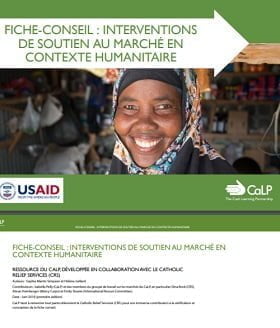
Fiche-Conseil : Interventions de soutien au marché en contexte humanitaire
Guides et outils
La fiche conseil définit le programme de soutien au marché en contexte humanitaire et le décrit dans la pratique. Elle permet aux praticiens humanitaires d’envisager systématiquement des interventions de soutien au marché, parallèlement à d’autres activités du programme. Le champ d’application comprend des interventions de soutien au marché axées sur l’offre/la disponibilité...
Thematic lead
Latest

Review of emergency cash coordination mechanisms in the Horn of Africa: Kenya and Somalia
Report
In response to the drought and famine in the Horn of Africa in 2011, cash transfer programming (CTP) has been used extensively as a modality to meet humanitarian needs. Partly because the conditions permitted it (functioning markets, cash economies and delivery mechanisms), and partly because delivering...
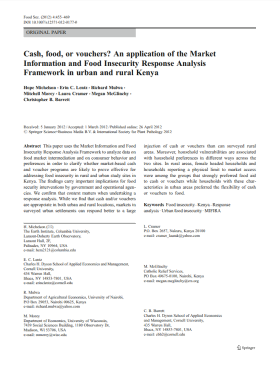
Cash, Food or Vouchers? An application of the market information and food insecurity response analysis framework in urban and rural Kenya
Policy paper
This paper uses the Market Information and Food Insecurity Response Analysis Framework to analyze data on food market intermediation and on consumer behavior and preferences in order to clarify whether market-based cash and voucher programs are likely to prove effective for addressing food insecurity...

Les transferts sociaux dans la lutte contre la faim
Rapport
Ce Document de Référence sur « les transferts sociaux dans la lutte contre la faim » a l’ambition de constituer une ressource pour soutenir l’intégration pratique des transferts sociaux dans les programmes s’attaquant au problème de l’insécurité alimentaire dans la coopération au...

Cash Emergency Preparedness (CEP) Pilots
Guidelines and Tools
CEP guidelines and key findings from pilot assessments.
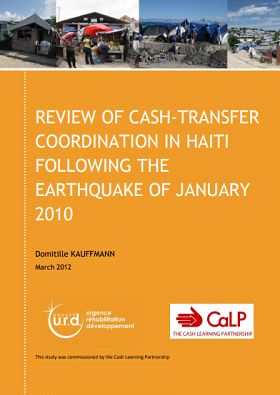
Review of Cash-transfer Coordination in Haiti following the Earthquake of January 2010
Case Study
This study, commissioned by the CALP Network, aims to review and document the coordination of cash transfer programmes (CTP) implemented from the emergency phase in Haiti. It is part of a wider review of CTP coordination in emergency situations which includes three case studies (Pakistan, Haiti and the...

Multi-Cluster/Sector Initial Rapid Assessment (MIRA)
Report
The immediate aftermath of a sudden-onset disaster is a critical period of time when the humanitarian and donor communities need to make key decisions on how to best support the affected country or region and its populations. However, during that brief period, limited comprehensive information on the...
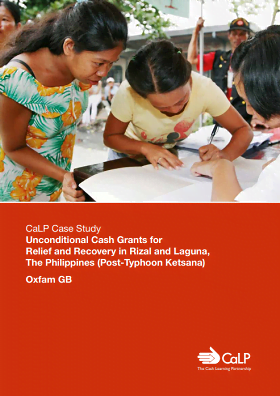
Unconditional Cash Grants for Relief and Recovery in Rizal and Laguna, The Philippines (Post-Typhoon Ketsana)
Report
In response to rapid onset flooding in Laguna and Rizal provinces in the Philippines, Oxfam International implemented a Cash Transfer Programme (CTP) in three phases: 1) Unconditional cash transfers for individuals to provide for basic needs; 2) Conditional cash transfers for individuals resuming income...

ICT/mobile Phone Technology: A shift in the right direction
Blog Post
Thirteen African nations came together for the AgriKnowledge Share Fair in Addis Ababa at the end of October 2012 to learn about approaches for quicker and more efficient humanitarian response. Government representatives, researchers, UN agencies and NGOs gathered for a three day symposium on best...
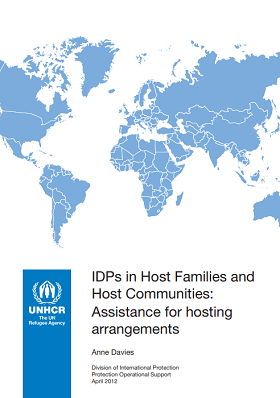
IDPs in Host Families and Host Communities: Assistance for Hosting Arrangements
Report
The phenomenon of internally displaced persons (IDPs) and refugees residing with host families is still relatively unexplored in comparison to what is known about IDPs and refugees living in camps. Of the nearly 14.7 million IDPs protected and assisted by UNHCR in 2010, an estimated 52% of the total live...
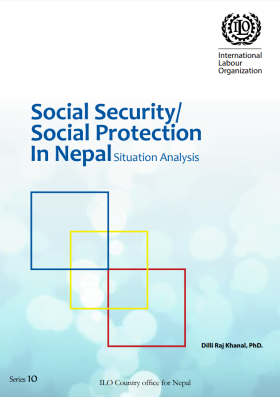
Social Security/Social Protection In Nepal: Situation analysis
Report
The International Labour Conference has outlined several strategies to extend social security by closing coverage gaps and pointed out that effective national strategies should be formed in line with national priorities, administrative feasibility and affordability. The primary goal is to ensure that no...

New Technologies in Cash Transfer Programming and Humanitarian Assistance – Executive Summary
Report
This is the executive summary of the CALP Network’s research on new technologies in cash transfer programming and humanitarian assistance. For more, please see the full report.

Child Safeguarding in Cash Transfer Programming
Guidelines and Tools
While cash transfers have become a key intervention in emergencies, they also pose increased and additional risks for beneficiaries, compared with other forms of assistance. Children are particularly vulnerable, and even more so in emergencies. The impact of cash transfer programming on children’s...

Kenya: Cash grants to support post-election violence livelihood recovery
Case Study
In response to post-election violence starting in late December 2007, ACF implemented a cash-based intervention in Nakuru, South Rift Valley, Kenya. This programme supported the local displaced and host population, who had been excluded from aid provided to internally displaced persons (IDPs) living in...
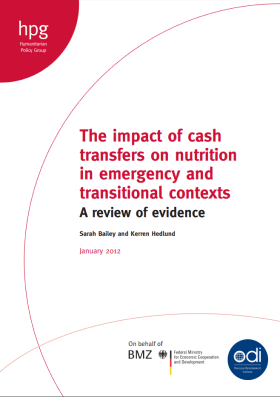
The Impact of Cash Transfers on Nutrition in Emergency and Transitional Contexts – Review of evidence
Report
This ODI / HPG commissioned report reviews the evidence of the impact of cash transfers on nutrition in emergency and transitional contexts. The research finds that evidence from humanitarian evaluations makes a strong case that cash transfers often improve dietary intake. There is less evidence that cash...
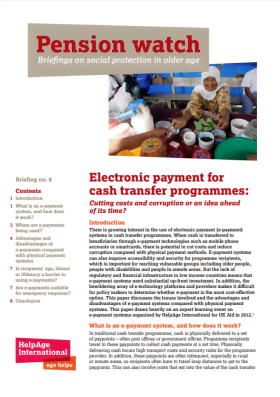
Pension Watch Briefing #8: Electronic payment for cash transfer programmes
Policy paper
There is growing interest in the use of electronic payment (e-payment) systems in cash transfer programmes. When cash is transferred to beneficiaries through e-payment technologies such as mobile phone accounts or smartcards, there is potential to cut costs and reduce corruption compared with physical...
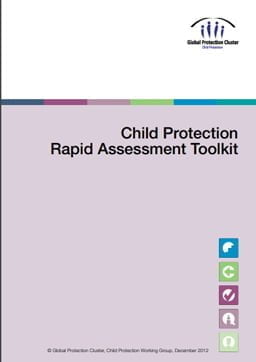
Child Protection Rapid Assessment Toolkit
Guidelines and Tools
The CPRA Toolkit provides all the information you need to conduct a CPRA over a five-week timeframe. The toolkit is divided into three parts: Part 1: a guide to CPRA provides an action plan with 6 key phases, giving guidance for tasks in each phase. Part 2: sample tools provides five key tools for...

Mobile Money Transfer: A study on effectiveness and efficacy!
Report
For this study both structured and semi-structured questioning method were used. Few KII (in depth interview) along with a pre-designed questionnaire were used for understanding the benefits and challenges of this new method on different stakeholders.
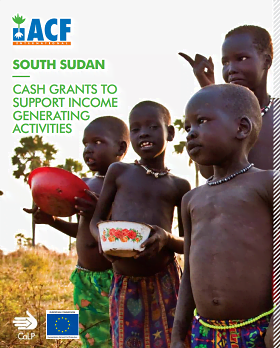
South Sudan: Cash grants to support income generating activities
Case Study
In response to chronic malnutrition, ACF implemented a cash-based intervention in Twic and Gogrial West Counties of Warrap State, South Sudan, using group cash grants to promote income generating activities. The programme addressed chronic livelihood vulnerability, which is a contributing factor to global...

Logistics and Administration Guideline for Cash Based Interventions
Guidelines and Tools
Cash-based interventions (CBIs) are increasingly included in humanitarian relief efforts as alternatives or complements to in-kind assistance. This guideline is mainly dedicated to logisticians and administrators to successfully support CBIs but also to technical departments. The objectives of this...

Comparative Review of Market Assessments Methods, Tools, Approaches and Findings – SWOT Analysis
Guidelines and Tools
This document makes a comparative review of different market assessments methods,tools, approaches and findings. A swot analysis of the Emergency Market Mapping Analysis (EMMA), Market Information and Food Insecurity Response Analysis (MIFIRA) and World Food Programme Trader Survey (WFP TS) is...
